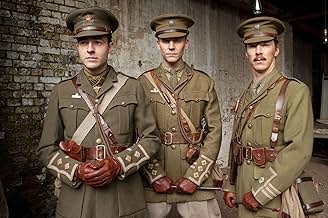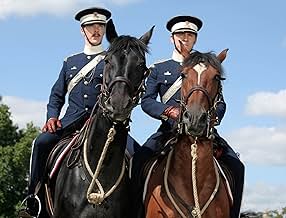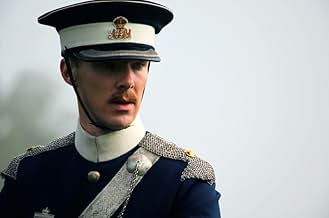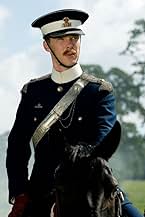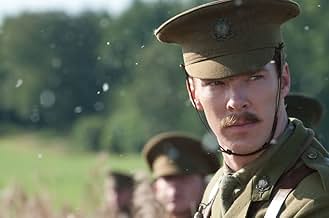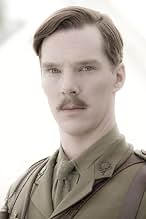O jovem Albert está se preparando para servir na Primeira Guerra Mundial depois de vender seu amado cavalo. Afasta-se da Inglaterra na direção da frente de combate à medida que a guerra avan... Ler tudoO jovem Albert está se preparando para servir na Primeira Guerra Mundial depois de vender seu amado cavalo. Afasta-se da Inglaterra na direção da frente de combate à medida que a guerra avança.O jovem Albert está se preparando para servir na Primeira Guerra Mundial depois de vender seu amado cavalo. Afasta-se da Inglaterra na direção da frente de combate à medida que a guerra avança.
- Indicado a 6 Oscars
- 15 vitórias e 76 indicações no total
Enredo
Você sabia?
- CuriosidadesDirector Steven Spielberg stated that the only digital effects used in the movie were three shots that lasted three seconds, and it was done to ensure the safety of the horse involved. Spielberg was quoted as saying, "That's the thing I'm most proud of. Everything you see on screen really happened."
- Erros de gravaçãoCaptain Nicholls is shown completely clean-shaven in 1914. In reality, British Army officers were not permitted to shave their upper lips until 1916.
- Citações
Albert Narracott: We'll be alright Joey. We're the lucky ones, you and me. Lucky since the day I met you.
- ConexõesFeatured in Breakfast: Episode dated 26 October 2011 (2011)
- Trilhas sonorasThe Scarlet and the Blue
By John Tams and Adrian Sutton
Avaliação em destaque
I was lucky enough to see War Horse in a special pre-screening last week, and I can safely say I will be seeing it again when its released on Christmas day. I went in with relatively low expectations, after watching the series of mediocre trailers, and walked out being able to safely say that War Horse is one of the best movies of the year, one of Steven Spielberg's best films, and, quite possibly, one of the best war films ever made, up there with my personal favorites The Thin Red Line, Apocalypse Now and Paths of Glory.
Steven Spielberg had long said that he didn't want to make Saving Private Ryan again. He said he wanted War Horse to be a war movie that parents cant take their children to and teach them something about love and war, and in this respect I can say that he more than succeeded. Spielberg comes close to the clinical perfection of Private Ryan, but more importantly, from an emotional perspective, War Horse far exceeds Private Ryan. There are many people apt to cry at Private Ryan, but War Horse is more likely to cause tears at a similar level to, say, Schindler's List. More importantly, unlike either Schindler or Private Ryan, War Horse is unlikely to cause any sort of political or moral complaints. He never tempers the anti-war message with nationalist tripe. Rather, he plays war straight. War is evil, men are good. There are no sides in this movie. In fact, at various points throughout the film, he seems to directly reject Saving Private 's heroism is dying for country message.
War Horse is based on the children's book and play of the same name. It is about a boy who's father, on a whim, buys a horse for his son that he knows will never be what is needed for the farm work it is purchased for. The boy forms an incredible bond with the horse. The first forty five minutes of the film is spent establishing the relationship between boy and horse. This part of the film is rather slow, but is necessary to establishing the film's central relationships, and is quickly made up for by the shift in pace as soon as the war begins. From the Scottish country side, after this important turning point in world history, War Horse shifts to France, where the titular horse is serving after being sold to the army. The boy is a year or two too young to follow his horse to Europe at this point, so for the next section, the film follows the horse only. From here on out, I will leave the plot a mystery, but it is gripping, thrilling, and very emotional.
There are two scenes in War Horse that I think are worthy of further mention. The first is a charge across no man's land. For anyone not familiar with the bulk of World War I's combat, it consisted of months at a time of back and forth shooting between trenches, broken up by awful charges across no man's land, to take a few hundred yards of enemy territory. These charges, as short as they were, as a result of the machine gun, came with death tolls in the thousands or higher. War Horse contains one of these charges, and it is carried out with both taste, and near perfect artistry. It is just grisly enough to get the reality across, but not so grisly that it makes the movie impossible to show to younger audiences. In fact, this trench charge ranks up with Steven Spielberg's other famous World War battle scene, the beach landing in Saving Private Ryan. It doesn't quite make it, but it comes close.
The other scene worthy of mention also occurs in the trenches, and reflects the other side of War Horse. The titular horse gets caught in the barbed wire in No Man's Land. The soldiers on either side spot it. No one knows what to do, as it is clear that its in incredible pain, but they know that leaving their respective trench would expose them to machine gun fire. Eventually two soldiers, one British, the other German both move to free the horse. The soldiers on both sides know what is going on, so no one fires a shot. This scene is unbelievably touching. The discussion they have (the German soldier happens to speak good English, explained adequately through a joke) will move even the most cynical of viewers, and gives a good idea of just what perspective War Horse takes to the act of war.
There are a few small problems in War Horse that, in most films, I would take issue with, but I will forgive in this case as I feel that they are so necessary for this film to appeal to younger audiences. The German soldiers speak English to one another, a big pet peeve for me. I would have preferred for French characters to speak subtitled French and German characters to speak subtitled Germans, but I recognize that many younger viewers refuse to read subtitles. There are a few unnecessary jokes, but again, younger viewers will enjoy these. Spielberg, as always, has three different endings tacked onto the movie, in this case necessary to provide the cut and dry resolution younger viewers require. As I said, these are still problems, but they are, for better or worse, required to accomplish what Spielberg was trying to.
I can say with absolute certainty that when Christmas rolls around, I will be dragging all my younger relatives to a screening of War Horse. I have never seen a movie so able to pull its punches enough to get a PG- 13 rating, but show enough to explain just what it is about war that makes it such an odious, disgusting, awful affair. In short, see War Horse as soon as you possibly can.
Steven Spielberg had long said that he didn't want to make Saving Private Ryan again. He said he wanted War Horse to be a war movie that parents cant take their children to and teach them something about love and war, and in this respect I can say that he more than succeeded. Spielberg comes close to the clinical perfection of Private Ryan, but more importantly, from an emotional perspective, War Horse far exceeds Private Ryan. There are many people apt to cry at Private Ryan, but War Horse is more likely to cause tears at a similar level to, say, Schindler's List. More importantly, unlike either Schindler or Private Ryan, War Horse is unlikely to cause any sort of political or moral complaints. He never tempers the anti-war message with nationalist tripe. Rather, he plays war straight. War is evil, men are good. There are no sides in this movie. In fact, at various points throughout the film, he seems to directly reject Saving Private 's heroism is dying for country message.
War Horse is based on the children's book and play of the same name. It is about a boy who's father, on a whim, buys a horse for his son that he knows will never be what is needed for the farm work it is purchased for. The boy forms an incredible bond with the horse. The first forty five minutes of the film is spent establishing the relationship between boy and horse. This part of the film is rather slow, but is necessary to establishing the film's central relationships, and is quickly made up for by the shift in pace as soon as the war begins. From the Scottish country side, after this important turning point in world history, War Horse shifts to France, where the titular horse is serving after being sold to the army. The boy is a year or two too young to follow his horse to Europe at this point, so for the next section, the film follows the horse only. From here on out, I will leave the plot a mystery, but it is gripping, thrilling, and very emotional.
There are two scenes in War Horse that I think are worthy of further mention. The first is a charge across no man's land. For anyone not familiar with the bulk of World War I's combat, it consisted of months at a time of back and forth shooting between trenches, broken up by awful charges across no man's land, to take a few hundred yards of enemy territory. These charges, as short as they were, as a result of the machine gun, came with death tolls in the thousands or higher. War Horse contains one of these charges, and it is carried out with both taste, and near perfect artistry. It is just grisly enough to get the reality across, but not so grisly that it makes the movie impossible to show to younger audiences. In fact, this trench charge ranks up with Steven Spielberg's other famous World War battle scene, the beach landing in Saving Private Ryan. It doesn't quite make it, but it comes close.
The other scene worthy of mention also occurs in the trenches, and reflects the other side of War Horse. The titular horse gets caught in the barbed wire in No Man's Land. The soldiers on either side spot it. No one knows what to do, as it is clear that its in incredible pain, but they know that leaving their respective trench would expose them to machine gun fire. Eventually two soldiers, one British, the other German both move to free the horse. The soldiers on both sides know what is going on, so no one fires a shot. This scene is unbelievably touching. The discussion they have (the German soldier happens to speak good English, explained adequately through a joke) will move even the most cynical of viewers, and gives a good idea of just what perspective War Horse takes to the act of war.
There are a few small problems in War Horse that, in most films, I would take issue with, but I will forgive in this case as I feel that they are so necessary for this film to appeal to younger audiences. The German soldiers speak English to one another, a big pet peeve for me. I would have preferred for French characters to speak subtitled French and German characters to speak subtitled Germans, but I recognize that many younger viewers refuse to read subtitles. There are a few unnecessary jokes, but again, younger viewers will enjoy these. Spielberg, as always, has three different endings tacked onto the movie, in this case necessary to provide the cut and dry resolution younger viewers require. As I said, these are still problems, but they are, for better or worse, required to accomplish what Spielberg was trying to.
I can say with absolute certainty that when Christmas rolls around, I will be dragging all my younger relatives to a screening of War Horse. I have never seen a movie so able to pull its punches enough to get a PG- 13 rating, but show enough to explain just what it is about war that makes it such an odious, disgusting, awful affair. In short, see War Horse as soon as you possibly can.
- Al_Scarface_Capone
- 4 de nov. de 2011
- Link permanente
Principais escolhas
Faça login para avaliar e ver a lista de recomendações personalizadas
- How long is War Horse?Fornecido pela Alexa
Detalhes
- Data de lançamento
- Países de origem
- Centrais de atendimento oficiais
- Idiomas
- Também conhecido como
- War Horse
- Locações de filme
- Castle Combe, Chippenham, Wiltshire, Inglaterra, Reino Unido(horse auction)
- Empresas de produção
- Consulte mais créditos da empresa na IMDbPro
Bilheteria
- Orçamento
- US$ 66.000.000 (estimativa)
- Faturamento bruto nos EUA e Canadá
- US$ 79.884.879
- Fim de semana de estreia nos EUA e Canadá
- US$ 7.515.402
- 25 de dez. de 2011
- Faturamento bruto mundial
- US$ 177.584.879
- Tempo de duração2 horas 26 minutos
- Cor
- Mixagem de som
- Proporção
- 2.39 : 1
Contribua para esta página
Sugerir uma alteração ou adicionar conteúdo ausente







